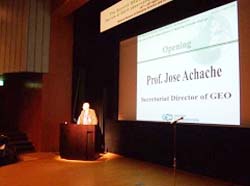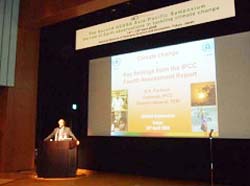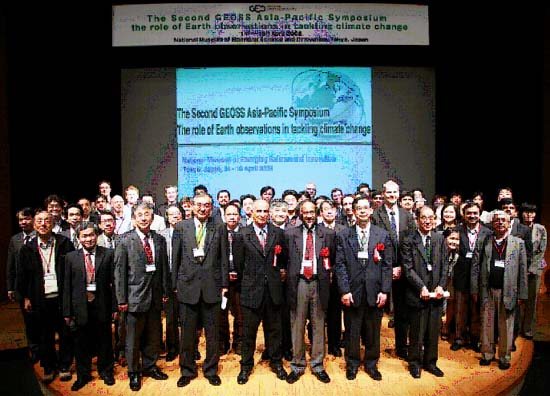The Second GEOSS Asia-Pacific Symposium
- The role of Earth observations in tackling climate change -

From April 14 to 16, 2008, the Second GEOSS Asia-Pacific Symposium "The role of Earth observations in tackling climate change" (2nd GEOSS AP Symposium) was held at the National Museum of Emerging Science and Innovation (Miraikan) in Japan. The symposium was organized by the secretariat of the Group on Earth Observations (GEO) with the support of the Japanese government. A total of 279 participants from 27 countries attended the symposium.
Message from Organizer to all APRSAF members
Prof. Jose Achache, GEO Secretariat Director
I guess my message would be that GEOSS needs coordination. GEOSS is designed to coordinate observation systems and this coordination will eventually be on a global scale. But to reach this global scale, we have to start on a regional scale and to build GEOSS, as a system of systems. And so coordinating space agencies on an Asia-Pacific level is a very good step toward global coordination of space agencies and observation systems. So we think the coordination efforts that APRSAF is making are of great value.
Comments form the Chair of Each Parallel Session
<Parallel Session 1: Monitoring and Predicting Climate Change>
Dr. Yukihiro Nojiri, National Institute for Environmental Studies (NIES), Japan
Climate change is threatening the safety and security of human society - as indicated by the recent Intergovernmental Panel on Climate Change (IPCC) Fourth Assessment Report (AR4) - and is becoming a top-priority political issue. The IPCC AR4 reported that warming of the climate system is unequivocal, as is now evident from observations of increases in global average air and ocean temperatures, widespread melting of snow and ice, and rising global mean sea level.
In this session, there were five sub-sessions to discuss the on-going and future plans for international collaboration regarding atmospheric greenhouse gasses (GHGs), oceanic and terrestrial carbon observation as well as climate observation that takes needs from modeling in the Asia-Pacific region, and to clarify the achievement of IPCC AR4 and the strategy of climate change modeling for IPCC AR5.
Based on the discussions in this session, we confirmed the necessity of a long-term and sustainable observation network under international collaboration as well as better understanding for each process related to climate change by using various methods and platforms. We showed the future tasks for carbon cycle and climate observation to improve the prediction of climate change as written in the summary report.
<Parallel Session 2: Earth Observations for Sustainable Water Management>
Prof. Toshio Koike, University of Tokyo
The Asia-Pacific region is prone to serious water-related problems such as floods, landslides, droughts, water shortages, water pollution and environmental deterioration, and is a region that is extremely sensitive to fluctuations in the water cycle caused by climate change.
We, therefore, think that it is very important for us to construct a network between observations by satellites and observations made on the ground under the GEOSS framework, and in addition to have integrated water resources management together with capacity-building by making effective use of observations, data analysis and predictions, and finally to promote international cooperation which can realize suitable methods for combating climate change.
This session first introduced a project for preparing a set of precipitation data by using observation data that had been taken on the ground and made into a grid. Then, there was a lecture on water cycle fluctuations that made use of a climate prediction model with super-high spatial resolution, and representatives of 15 countries reported on the current situation in their owns countries and how they are affected by climate change, the social problems it causes and suitable ways of dealing with it that are being now implemented and planned. The reporting countries are shown below.
Bangladesh, Bhutan, India, Indonesia, Japan, Malaysia, Mongolia, Nepal, Pakistan, Philippines, South Korea, Sri Lanka, Thailand, Uzbekistan and Vietnam.
After that, there were some introductions of GEO tasks, organizations related to the UN and urgent themes of GEOSS related to water in Asia-Pacific.
We fully discussed and summarized the following implementation plan by considering the above-mentioned lectures, reports and presentations.
1. Summarization of water cycle fluctuations, problems and suitable ways to deal with them in each country in cooperation with other participating countries.
2. Construction of an end-to-end approach from observation to application under a GEOSS framework.
3. Promotion of integrated GEOSS data to provide valuable information for suitably dealing with problems.
4. Promotion of capacity building.
Finally we adopted the following summary report including promotion of GEOSS tasks toward the G8 summit.
- Construction of prediction model for floods and water resources management.
- Monitoring of global water quality.
- Integration of observations by satellites and observations on the spot for monitoring the water cycle.
- Program of capacity building for water resources management.
<Parallel Session 3: Using GEOSS to Manage Ecosystems and Protect Biodiversity>
Prof. Tohru Nakashizuka, Tohoku University
IPCC AR4 reports that the effects of global warming can no longer be avoided, and many effects on ecosystems and biodiversity have already been observed.
There are many chances for on-the-spot observations of a variety of items regarding ecosystems and biodiversity, but when thinking about appropriate countermeasures against global warming it is clear that observations which are connected to solutions to global warming are need.
At this symposium, the importance of observations connected with on-the-spot observations and extensive observations such as remote sensing was recognized.
In recent years, some observation networks such as ILTER (International Long-Term Ecological Research Network) for ecosystems and GEO BON (Group on Earth Observations Biodiversity Observation Network) for biodiversity have been constructed. In addition to this, databases are being constructed and the mutual operations between ILTER and GBIF (Global Biodiversity Information Facility) are being improved.
There is an urgent need to accelerate these developments. Improving observational capacities will be a big problem, especially in developing countries. However, observing many spots is also a big problem in Japan because observation by parataxonomists and volunteers will be needed. On the other hand, some techniques and models have been introduced that could solve problems like these.
I would like to assess this symposium as one in which we could share problems related to observations for global warming, and promote communication between different networks. I hope that in future some excellent observation bases will be established in Asia-Pacific in this field.
<Paralle Session 4: Mapping Forest and Tracking Carbon>
Dr. Yoshiki Yamagata, Special Senior Researcher of Center for Global Environment Research, National Institute for Environmental Studies (NIES)
A session on forest mapping and carbon tracking was set up recently, and was related to taking steps against global deforestation which is connected to global warming, and which is becoming a subject for the next framework (so-called Post Kyoto) from 2012 onward.
At this session, we eagerly discussed establishing a GEOSS for a new forest mapping system and carbon tracking on the basis of presentations (18 items) by leading researchers in the world for carbon tracking related to forest mapping, and we all agreed on the summary report.
At this session, we discussed a new GEOSS for forest mapping and carbon tracking and we all agreed on a recommendation for it, which I think is a great result.
I really hope that in future a new task will be formally set up and a systematic strategy for forest mapping and carbon tracking will be built that makes use of the data of existing and future SAR sensors.

Opening
Prof. Jose Achache
GEO Secretariat Director

Keynote Speech
Dr.Rajendra K Pachauri
Chairman of Intergovernmental Panel on Climate
Change (IPCC)
Group on Earth Observations Website: http://www.earthobservations.org/
2nd GEOSS AP Symposium Website: http://www.prime-intl.co.jp/geoss/
